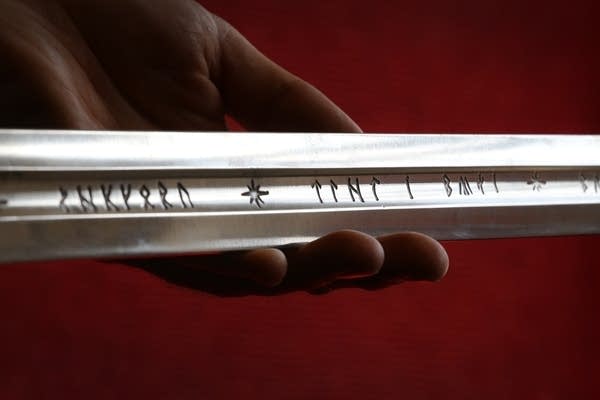Literary mysteries: Did Tolkien really create entire languages for his books?

Go Deeper.
Create an account or log in to save stories.
Like this?
Thanks for liking this story! We have added it to a list of your favorite stories.
The question: Did J.R.R. Tolkien really create entire languages for his novels?
Tancave!
That's Quenya for "yes."
Quenya is just one of the dozens of languages Tolkien dreamed up for the inhabitants of Middle Earth. Technically, it's part of the Elvish language family, which has over 15 different languages and dialects within it.
Turn Up Your Support
MPR News helps you turn down the noise and build shared understanding. Turn up your support for this public resource and keep trusted journalism accessible to all.
And that's only the beginning. Tolkien created his first constructed language when he was just a teenager. He was a master of actual languages as well. He knew 35 different tongues, both ancient and modern — everything from Old Norse to Lithuanian. He taught himself Finnish for fun.
For Tolkien, the languages came first. Middle Earth and the "Lord of the Rings" epics were created around his constructed languages. Basically, he invented words and needed speakers.
He created the 15 different Elvish dialects, along with languages for the Ents, the Orcs, the Dwarves, the men and the Hobbits and more. He thought of everything: The Dwarves even had a separate sign language, because the forges they worked were too loud.
If Tolkien had gotten his way, the books wouldn't have even been in English at all. "I should have preferred to write in Elvish," Tolkien said.
Of all the languages Tolkien created, two have enough words and grammar to be considered functional. They're not "complete," in the sense that they lack niche words, like "flambe" or "hydro nucleic acid," but people do speak and write in them. These languages are both Elvish in origin: Quenya and Sindarin.
When he died, Tolkien left behind a large number of unpublished works, many of which are still being studied. New words are still being uncovered. Tolkien was meticulous with his languages. His original manuscripts, which are at Marquette University in Milwaukee, Wis., contain extensive notes in the margins about his word use.
Curious folk who want to converse in Elvish themselves are in good company. The Internet abounds with language worksheets and pronunciation videos to kick start your studies.
Quel marth!
(Good luck!)
Do you have a question? Send us your literary mystery here.


